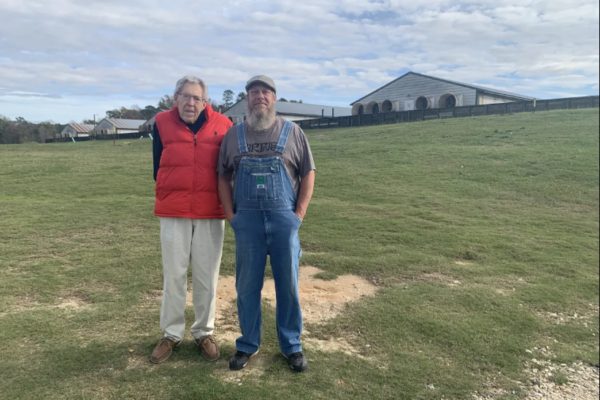By: Lisa Sorg, NC Policy Watch
December 21, 2021
A three-judge panel from the state Court of Appeals unanimously ruled against an environmental justice group today, deciding that North Carolina legislature had the authority to make it difficult, if not impossible, for people to sue hog farms for nuisance.
The ruling affirmed a lower court’s decision.
The amendments to the Farm Acts of 2017 and 2018 “are a valid exercise of legislative and the State’s police powers,” wrote Justice John Tyson. Nor are they “a special or private law, and do not deprive a prospective plaintiff of the right to a jury trial.”
Judges Jefferson Griffin and Fred Gore concurred.
Civil rights attorneys Burton Craige and Elizabeth Haddix represent the plaintiffs — REACH, a group of eastern North Carolina residents — in challenging the Farm Acts of 2017 and 2018 — House Bill 467 and Senate Bill 711, respectively.
The defendants were State Rep. Tim Moore and State Sen. Phil Berger; the NC Farm Bureau had filed as an intervenor with the defense; the state Department of Agriculture had filed a friend-of-the-court brief in support of the defense.
Lawmakers had passed both bills in direct response to federal nuisance lawsuits filed against Smithfield Foods by hundreds of neighbors of industrialized hog farms. In five of those federal cases, juries eventually awarded millions of dollars in damages to the neighbors. The remaining 20 or so cases were settled out of court.
The litigation was filed before the Farm Acts were passed; now those types of lawsuits would unlikely be filed.
The plaintiffs’ attorneys initially argued before Wake Superior Court that provisions in the acts deprived neighbors of agricultural and forestry operations fundamental property rights. In 2020, that court dismissed the plaintiffs’ constitutional challenges.
The plaintiffs appealed, and earlier this month, their attorneys asked the appellate court to apply what’s known as a “means-ends” test to determine the constitutionality of the Farm Acts.
- Is the law necessary to accomplish the government’s goals?
- Is the law reasonable in its degree?
- And is the law enacted for a public purpose?
Craige argued that the Farm Acts met none of those requirements.
Under the Farm Act of 2018, neighbors can’t sue unless they do so within a year that the farm begins operating. Since all of North Carolina’s hog farms began operating before 1997, when a moratorium on new or expanded farms went into effect, it’s nearly impossible to sue for nuisance.
Nor can plaintiffs recover punitive damages, which juries can award in cases of “willful or wanton conduct.” In four of the five federal cases, juries awarded plaintiffs punitive damages; in the fifth case, the judge prohibited the jury from doing so.
The law also set a geographic radius — half-mile from the problematic farm — for neighbors who are eligible to sue for nuisance.
Hog farms are exempt from nuisance suits, as long as the state has not cited them for civil or criminal penalties for water quality violations in the past three years; the law does not consider degraded air quality as a nuisance.
Farms and forestry operations can’t be sued for nuisance if the ownership or type of agriculture changes — from chickens to hogs, for example. These entities are also immune even if they expand or install new technology — like biogas systems, which are proliferating in eastern North Carolina.
Because of these restrictions, Craige argued, “no change, however radical will meet the threshold.”
The appellate judges disagreed.
The 2017 and 2018 Farm Acts, Tyson wrote, underscore the state’s policy in promoting agricultural and forestry activities and production by defining and limiting nuisance claims against those industries.
“Limiting potential nuisance liability from agricultural, forestry, and related operations helps ensure the State’s stated goal to protect agricultural activities in North Carolina and to encourage the availability and continued “production of food, fiber, and other products,” Tyson wrote.
He added: “Our State’s long-asserted interest in promoting and preserving agriculture, forestry, horticulture, livestock, and animal husbandry activities and production within North Carolina clearly rests within the scope of the State’s police power.”
When the legislature was debating the Farm Acts, several lawmakers described the nuisance provisions as a “carve-out” for agriculture and forestry.
But the appellate court ruled that since the laws are generally applicable to these industries, they do not create a special protected class.
“A private law is confined to particular individuals, associations or corporations,” Tyson wrote, citing previous court cases. Although Smithfield Foods has a near-monopoly in North Carolina — Prestage Farms being the only other major pork producer — it was not singled out by name in the Farm Acts.
Plaintiffs’ attorneys could appeal the decision to the state Supreme Court, but it’s unclear if they will do so. Haddix could not be reached for comment on Tuesday.





